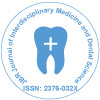Research Article
Evaluation of the Effect of Tooth Surface Wetting and Bond Strength of Composite-an In vitro Study
Singh Yashpal* and Saini Monika
Qassim Private College, Saudi Arabia
- Corresponding Author:
- Dr. Yashpal Singh
Associate professor
Head of Oral and maxillofacial rehabilitation
Qassim private college, Saudi Arabia
Tel: 966-538921650
E-mail: dryashpal.singh@gmail.com
Received Date: November 30, 2013; Accepted Date: January 24, 2014; Published Date: January 27, 2014
Citation: Yashpal S, Monika S (2014) Evaluation of the Effect of Tooth Surface Wetting and Bond Strength of Composite-an In vitro Study. J Interdiscipl Med Dent Sci 2:111. doi: 10.4172/2376-032X.1000111
Copyright: © 2014 Yashpal S, et al. This is an open-access article distributed under the terms of the Creative Commons Attribution License, which permits unrestricted use, distribution, and reproduction in any medium, provided the original author and source are credited
Abstract
Adhesive restorations have become integral part of routine dental treatment. To achieve clinical success with such restorations, it is of clinical importance to ensure good bonding between this restoration and tooth surface. Bonding to dentin is far more challenging. Bond between dentin and dentin bonding adhesives is greatly influenced by: (1) Surface condition of dentin (moist/dry); (2) Chemical nature of dentin bonding agents. The present study has been designed: (i) to study the effect of various conditions (moist/dry) of dentin on bonding with dentin bonding agents; (ii) to compare the strength achieved by dentin, bonding agent of different systems (water/acetone based). This study was conducted to evaluate the effect of tooth surface wetting on shear bond strength of composite. Freshly extracted central incisors were taken. Cavities were prepared in middle 1/3 of teeth. Teeth were divided in groups A,B,C depending on their surface treatment (wet, semi dry, dry surface) and again in to sub groups depending on whether they are treated water based or acetone based dentin bonding agents(scotch bond, prime bond NT, clear fil SE) . All the cavities in samples were filled with composite and light cured. Composite was debonded from teeth by Instron machine. Debonded samples were scanned and micro graphed under SEM. From the observations made, statistically analyzed and duly discussed, following conclusions are drawn: 1. Optimal water content is necessary for achieving good bonding between dentin and composite. 2. Water based dentin bonding agents, show maximum shear bond strength with dentin in dry conditions. 3. Acetone based dentin bonding agents show maximum shear bond strength with dentin in wet conditions. Overview of the results shows that moisture plays a vital role in bonding of composite with dentin. Optimal water should be present for better bonding of dentin with composite. If dentin is in dry stage, then water based dentin-bonding agents should be used as they produce best results in dry conditions and if dentin is in wet state then acetone based dentin-bonding agents should be used as they produce best results in wet conditions.

 Spanish
Spanish  Chinese
Chinese  Russian
Russian  German
German  French
French  Japanese
Japanese  Portuguese
Portuguese  Hindi
Hindi